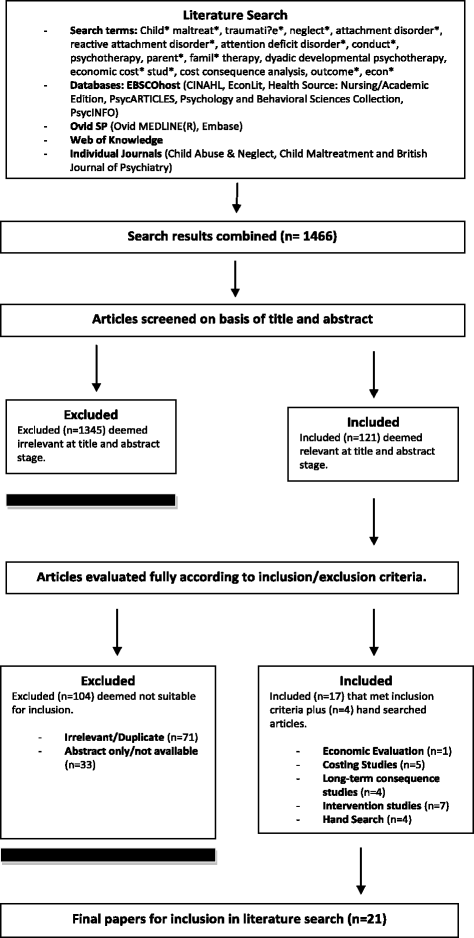Examining the feasibility of an economic analysis of dyadic developmental psychotherapy for children with maltreatment associated psychiatric problems in the United Kingdom
- PMID: 25492801
- PMCID: PMC4299309
- DOI: 10.1186/s12888-014-0346-0
Examining the feasibility of an economic analysis of dyadic developmental psychotherapy for children with maltreatment associated psychiatric problems in the United Kingdom
Abstract
Background: Children with maltreatment associated psychiatric problems are at increased risk of developing behavioural or mental health disorders. Dyadic Developmental Psychotherapy (DDP) was proposed as treatment for children with maltreatment histories in the USA, however, being new to the UK little is known of its effectiveness or cost-effectiveness. As part of an exploratory study, this paper explores the feasibility of undertaking economic analysis of DDP in the UK.
Methods: Feasibility for economic analysis was determined by ensuring such analysis could meet key criteria for economic evaluation. Phone interviews were conducted with professionals (therapists trained and accredited or in the process of becoming accredited DDP practitioners). Three models were developed to represent alternative methods of DDP service delivery. Once appropriate comparators were determined, economic scenarios were constructed. Cost analyses were undertaken from a societal perspective. Finally, appropriate outcome measurement was explored through clinical opinion, literature and further discussions with clinical experts.
Results: Three DDP models were constructed: DDP Full-Basic, DDP Home-Based and DDP Long-Term. Two potential comparator interventions were identified and defined as Consultation with Carers and Individual Psychotherapy. Costs of intervention completion per case were estimated to be: £6,700 (DDP Full-Basic), £7,100 (Consultations with Carers), £7,200 (DDP Home-Based), £11,400 (Individual Psychotherapy) and £14,500 (DDP Long-Term). None of the models of service delivery were found to currently measure effectiveness consistently. The Strengths and Difficulties Questionnaire (SDQ) was deemed an appropriate primary outcome measure, however, it does not cover all disorders DDP intends to treat and the SDQ is not a direct measure of health gain. Inclusion of quality of life measurement is required for comprehensive economic analysis.
Conclusions: Economic analysis of DDP in the UK is feasible if vital next steps are taken to measure intervention outcomes consistently, ideally with a quality of life measurement. An economic analysis using the models constructed could determine the potential cost-effectiveness of DDP in the UK and identify the most efficient mode of service delivery.
Figures
References
-
- Rutter M, Colvert E, Kreppner J, Beckett C, Castle J, Groothues C, Hawkins A, O’Connor TG, Stevens SE, Sonuga-Barke EJ. Early adolescent outcomes for institutionally-deprived and non-deprived adoptees. I: disinhibited attachment. J Child Psychol Psychiatry. 2007;48(1):17–30. doi: 10.1111/j.1469-7610.2006.01688.x. - DOI - PubMed
-
- Smyke AT, Zeanah CH, Gleason MM, Drury SS, Fox NA, Nelson CA, Guthrie D. A randomized controlled trial comparing foster care and institutional care for children with signs of reactive attachment disorder. Am J Psychiatry. 2012;169(5):508–514. doi: 10.1176/appi.ajp.2011.11050748. - DOI - PMC - PubMed
-
- Stevens SE, Sonuga-Barke EJ, Kreppner JM, Beckett C, Castle J, Colvert E, Groothues C, Hawkins A, Rutter M. Inattention/overactivity following early severe institutional deprivation: presentation and associations in early adolescence. J Abnorm Child Psychol. 2008;36(3):385–398. doi: 10.1007/s10802-007-9185-5. - DOI - PubMed
-
- Becker-Weidman A, Hughes D. Dyadic developmental psychotherapy: an evidence-based treatment for children with complex trauma and disorders of attachment. Child Fam Soc Work. 2008;13:329–337. doi: 10.1111/j.1365-2206.2008.00557.x. - DOI
-
- The ICD-10 Classification of Mental and Behavioural Disorders: Diagnostic Criteria for Research. Geneva: World Health Organisation; 2010.
Publication types
MeSH terms
LinkOut - more resources
Full Text Sources
Other Literature Sources
Medical
Research Materials


